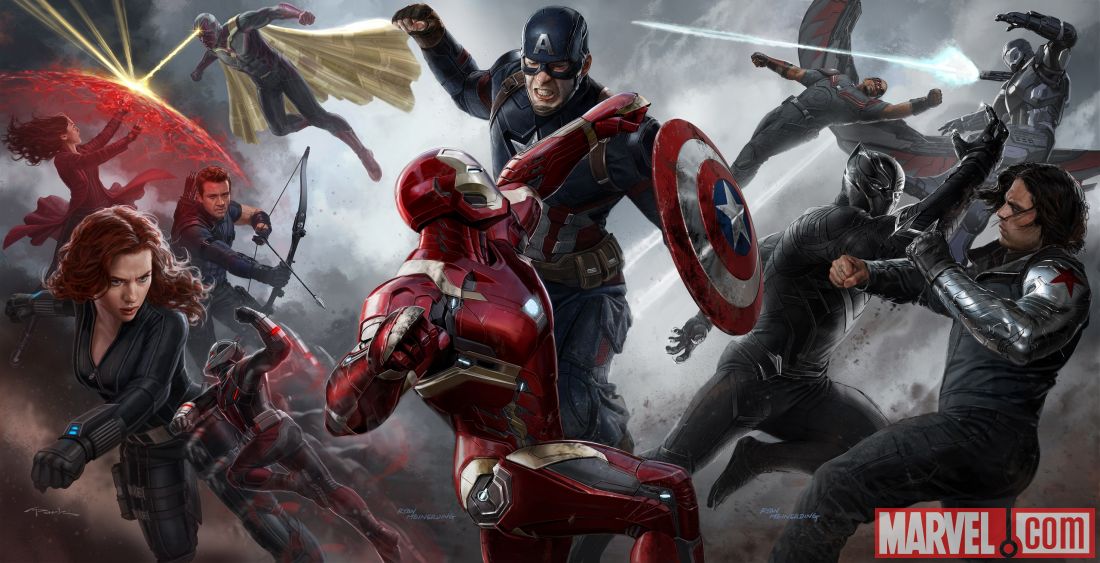Superhero movies have a villain problem
Hollywood has managed to make world-destroying villains utterly banal


A free daily email with the biggest news stories of the day – and the best features from TheWeek.com
You are now subscribed
Your newsletter sign-up was successful
There's a gleeful allure to villainy, a profound "I wanna be bad, baby" kick you can't get from rooting for the good guys. All that scheming and skulking and no-good-doing taps into deep dark desires that, for most moviegoers of at least moderate moral standing, go unfulfilled in real life.
It's fun to root for a bad guy, to bask in the unrepentant, vicarious glory of ruination and selfishness. It is, of course, also fun to see a bad guy get what's coming to 'em. While television has, in the post-Sopranos era, turned to the now-ubiquitous anti-hero to satiate our need for watching bad people behaving badly, Hollywood's biggest superhero action movies have taken a slightly different, significantly less satisfying approach. They're now pitting heroes against each other for internecine, low-stakes destruction.
This is the least-interesting possible approach. Instead, superhero movies just need better villains.
The Week
Escape your echo chamber. Get the facts behind the news, plus analysis from multiple perspectives.

Sign up for The Week's Free Newsletters
From our morning news briefing to a weekly Good News Newsletter, get the best of The Week delivered directly to your inbox.
From our morning news briefing to a weekly Good News Newsletter, get the best of The Week delivered directly to your inbox.
The most nefarious thing a movie villain can do is bore the audience, and today's gaggle of villains are often as banal as the complex financial vehicles villainized in The Big Short. From Darren Cross/Yellowjacket (wasting Corey Stoll in a nothing role should be a federal offense) in Ant-Man to Doom in Fantastic Four, Ronan the Accuser in the otherwise fun Guardians of the Galaxy to Ajax in Deadpool (though you might argue that the real villain of Deadpool is Ryan Reynolds' utter disdain for his previous experience playing superheroes, which lethargically courses through the entire film like a blood clot), today's villains are terrible for all the wrong reasons. The last great villain we got was Tom Hiddleston's deliciously delinquent Loki in The Avengers in 2012; his absence left a gaping wound in Age of Ultron that no amount of CGI-saturated chaos could fill. Puny God.
2016's first two major superhero movies basically don't even have villains. Instead, they hinge on the heroes-as-villains gimmick. First we were subjected to Batman v Superman, in which the two titular heroes, both of whom have apparently had their IQs halved to fall for Lex Luthor's ludicrous ploy, clash in a silly bout of demi-God fisticuffs and leave yet another city in smoldering ruins. This weekend we get Captain America: Civil War, in which the mighty Avengers (save for Thor and the Hulk, who are on a buddy road trip across the cosmos, or something) are split into two warring factions over differing political ideologies.
Watching superheroes bludgeon each other is fun, in a way, for a while, though there's something deeply, dully disappointing about the lack of interesting bad guys in these movies. (Zack Snyder did try to stick a real Big Bad into BvS, in the form of a troll-like monster thing that's supposed to be Doomsday but totally isn't, and his lame effort reeks of desperation.)
The best superhero movies have great villains. Indeed, great villains are quite often what make these movies so great, as villains are, generally speaking, more interesting than heroes. They have freedom to be fun and eccentric, whereas Marvel and DC's flagship heroes are shackled to certain requisite standards (the Punisher notwithstanding). Tim Burton's Batman (1989) marks the advent not only of big budget superhero movies, but of villains overshadowing their more heroic foils. As the Joker, Jack Nicholson received top billing (and a fat paycheck) over Michael Keaton, who portrayed the guy after whom the film was ostensibly named. For all its flaws, the film is still plenty fun largely because of Nicholson's dastardly decadence — think of that sublime museum scene set to Prince's "Partyman," a scene way too weird and flamboyant for modern superhero movies.
A free daily email with the biggest news stories of the day – and the best features from TheWeek.com
In Batman Returns (1992), the closest to Grand Guignol any superhero movie has ever come, Burton and his cadre of screenwriters tripled the number of villains (Penguin, Catwoman, Christopher Walken), turning Batman into a supporting player in his own movie. It worked spectacularly well, because the cast is impeccable and the villains are ridiculously fun. Danny DeVito chews scenery (and noses) with relish as the Penguin, Michelle Pfeiffer's sultry and sinister Catwoman saunters out of a gothic sex dream, and Christopher Walken... well, he's Christopher Walken. The Penguin's evil plot concerns the mass murder of Gotham's first-born sons because his parents threw him and his baby carriage into an icy river, and involves a choo-choo train of death and an army of kamikaze penguins with rockets strapped to their backs. It's weird and brilliantly entertaining. The Penguin has a specific target for his plan, which makes his insidiousness feel more intimate, like a long-gestating, lugubrious nightmare seeping out of his head and into the streets of Gotham. By contrast, Apocalypse wanting to enslave all of humanity in the new X-Men feels like such a generic, empty threat, just another bully who overcompensates for his lack of imagination by destroying the world. Joss Whedon was cracking wise about the vapidity of perpetual apocalyptic threats by season three of Buffy — how have movies, his own included, not caught on yet?
The great supervillain plots are personal, more intimate than just Destroy The World™. Sam Raimi's Spider-Man 2, still the standard by which modern superhero movies should be measured, found a tragic and frightening villain in Alfred Molina's Doctor Octopus, whose wife was killed when his attempt to harness energy to help the city backfired. Molina instilled Doc Ock with as much malaise as he did menace. You even feel bad when he dies at the end, with that lyrical shot of his body sinking into the sea, mechanical tendrils writhing in the current like seaweed. Marc Webb's Amazing Spider-Man movies have villains, but for the life of me I can't even remember them. I think Paul Giamatti was a rhino, or something. The villain of Civil War is, uh... government regulation?
The best villains aren't just Big Bad Guys but colorful characters, demented and deranged but undeniably fun to watch. Without Heath Ledger's crypto-anarchist Joker, The Dark Knight wouldn't have been nearly as beguiling. (Even Christian Bale thinks his performance paled in comparison to Ledger's.) Age of Ultron made a brilliant move by casting James Spader (or his sanguine voice, at least) as Ultron, but didn't give him anything to do. Iron Man 3 tried to be clever when it turned out the villain was just a guileless actor being manipulated by a guy in an expensive suit — a potential metaphor for how the production of these movies works. But such chicanery isn't necessary if writers/directors can simply conjure up good, old-fashioned villains.
As Giles said on Buffy, "My contrition completely dwarfs the coming apocalypse." More contrition, fewer apocalypses, please.
Greg Cwik is a writer and editor. His work appears at Vulture, Playboy, Entertainment Weekly, The Believer, The AV Club, and other good places.
-
 The environmental cost of GLP-1s
The environmental cost of GLP-1sThe explainer Producing the drugs is a dirty process
-
 Greenland’s capital becomes ground zero for the country’s diplomatic straits
Greenland’s capital becomes ground zero for the country’s diplomatic straitsIN THE SPOTLIGHT A flurry of new consular activity in Nuuk shows how important Greenland has become to Europeans’ anxiety about American imperialism
-
 ‘This is something that happens all too often’
‘This is something that happens all too often’Instant Opinion Opinion, comment and editorials of the day
